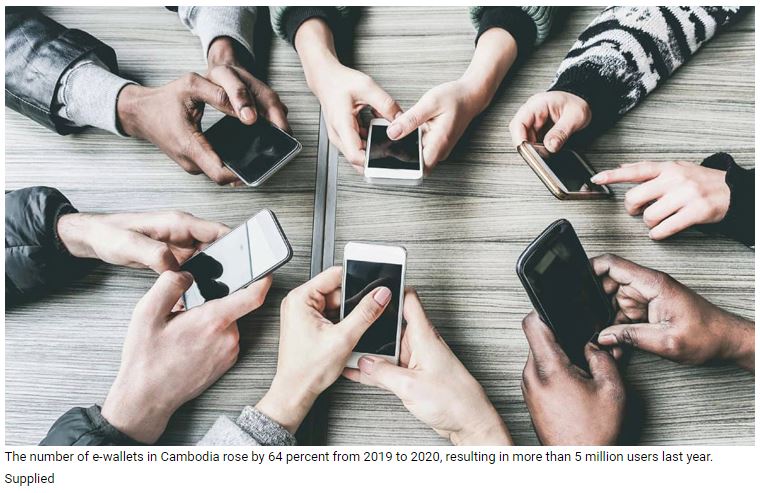Fintech points the way to full financial inclusion for Cambodians
With more cellphones existing in the Kingdom than citizens and one of the youngest populations in the world, Cambodia’s mobile financial industry may be poised to bring the Kingdom’s deficit in financial inclusion to an end. This potential tipping point could mean the end to Cambodia’s status as one of the most underbanked nations in the world, according to experts.
Currently, only 17.8 percent of Cambodians over 14 years of age have a bank account, according to 2017 World Bank data.
Southeast Asia is a hotbed in e-wallets and digital payment app usage, with China’s AliPay and WeChat Pay dominating the regional digital payment landscape. The number of e-wallets in Cambodia rose by 64 percent between 2019 and 2020, amounting to more than 5 million users last year. At the forefront of that growth is Wing, which accounts for more than half of the value of the digital transactions conducted in the nation.
“I see a tipping point over the next five to six years. There is a huge young population ready to come into the mainstream financial services segment. E-wallets will become the norm as younger people start teaching their elders how to use them,” Wing Chief Executive Officer Manu Rajan said.
Wing’s popularity is such that its name is now used as a verb. Wing agents facilitated more than 165 million transactions in 2019. Those transactions and their total value of $50 billion made Wing the market leader for Cambodia last year in their sector.
Wing’s services represent a lifeline for the underbanked and an amenity for others. Garment workers, the majority of whom are women, have the option of receiving loans from Wing with no conditions or interest applied, freeing them from unscrupulous and predatory loan providers.
Asad Yaqub, International Finance Corp (IFC) representative in Cambodia, said his organisation recognises a huge opportunity in the growth of mobile banking in the Kingdom. He sees new technology as leapfrogging traditional banking systems as it helps people overcome barriers to accessing financial services.
“There is no doubt that safety restrictions during COVID-19 and general apprehension over safety concerns in the handling of cash notes has greatly contributed to a high acceptance rate and mobile growth in Cambodia,” he added.
“We know from our global experience at IFC that mobile payments can significantly spur financial inclusion,” he said.
The lack of access to financial institutions is a proven strain to the local economy, particularly among the rural population, whose modest savings rarely validates having a brick-and-mortar bank nearby.
Citing Bangladesh as an example, Yaqub noted that IFC investment in the bKash ecosystem helped increase access to formal financial services by 40 percent with more than 27 million registered users over the past decade.
“There is a difference between the way Cambodia has adopted digital transactions and the way the developed world did. Here, it is necessity that drove the growth initially rather than convenience. That’s why the Agent Banking Model still drives Cambodia’s digital transactions rather than self-done transactions,” Wing’s Rajan said.
“Over the next three to four years, we will see a tipping point that will lead to a mass adoption of e-wallets and mobile financial services, which will help financial inclusivity.”
Already, signs of a shift have begun to sprout in earnest. Led by China, which has removed 30,000 automated teller machines (ATMs) from service, the number of global ATM installations fell by 1 percent last year, according to research firm Valluates.
Conversely, the global e-market share, which was valued at $1.04 billion last year, is expected to grow to $7.5 billion by 2027.
A study conducted by the Asian Development Bank showed improving the Kingdom’s financial inclusivity could boost its gross domestic product by 6 percent if formal financial products and services were delivered to all segments of the population.
“Globally, IFC provided access to financial services to [more than] 60 million people with only $200 million in investments in 30 fintech companies. We seek to accelerate financial inclusion to another 350 million people by scaling up our investments in this area.
In aggregate this would account for 40 percent of the World Bank Group’s commitment to financial inclusion,” said Yaqqub.
Source: https://www.khmertimeskh.com/50809969/fintech-points-the-way-to-full-financial-inclusion-for-cambodians/


 English
English




